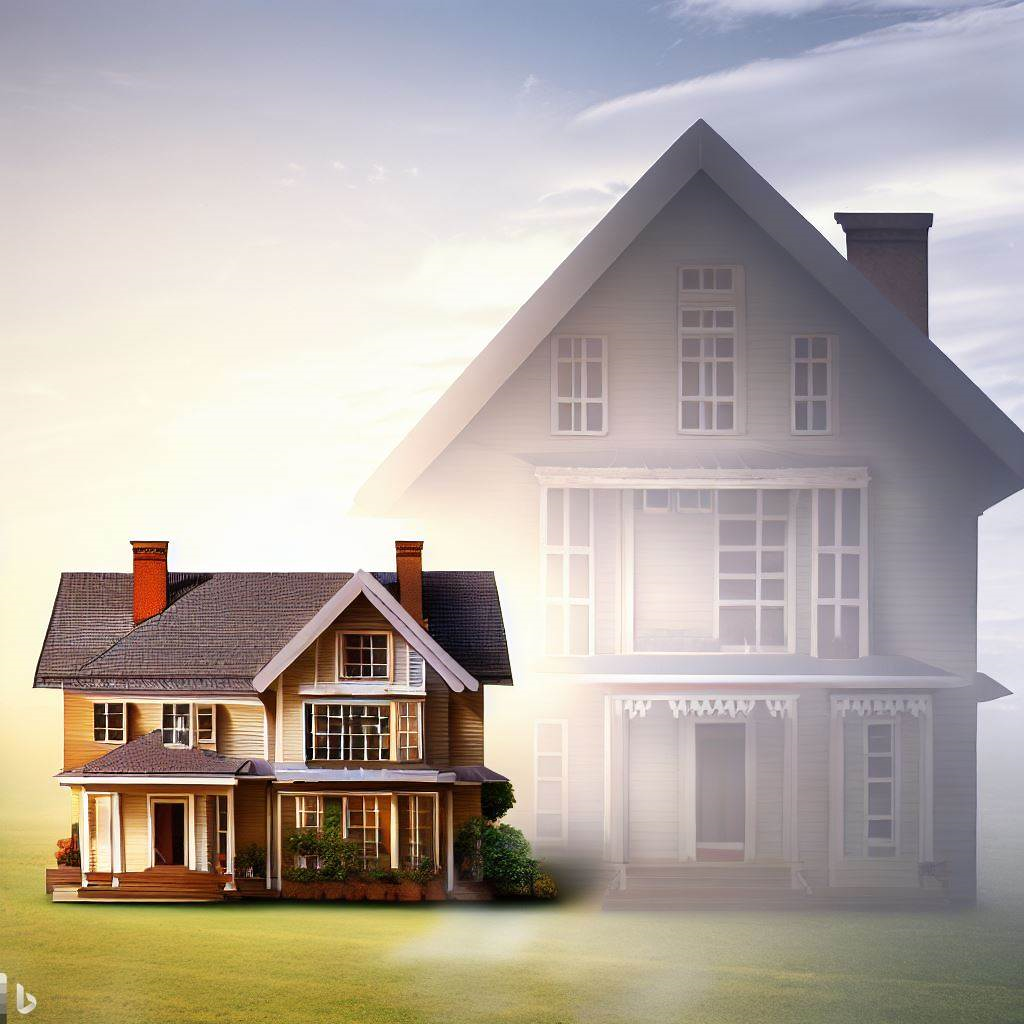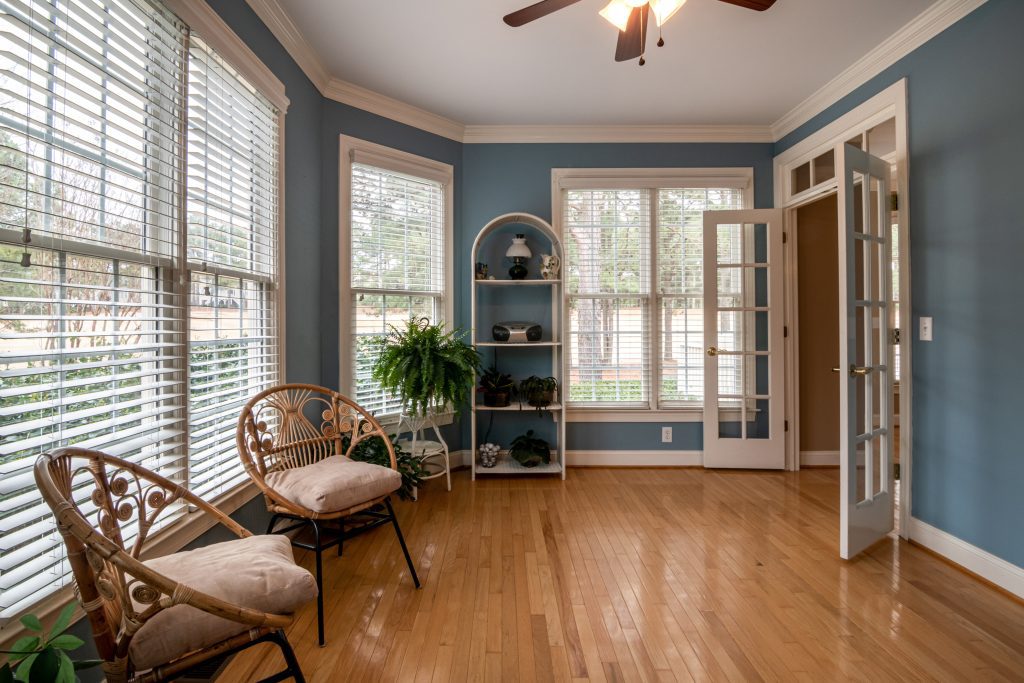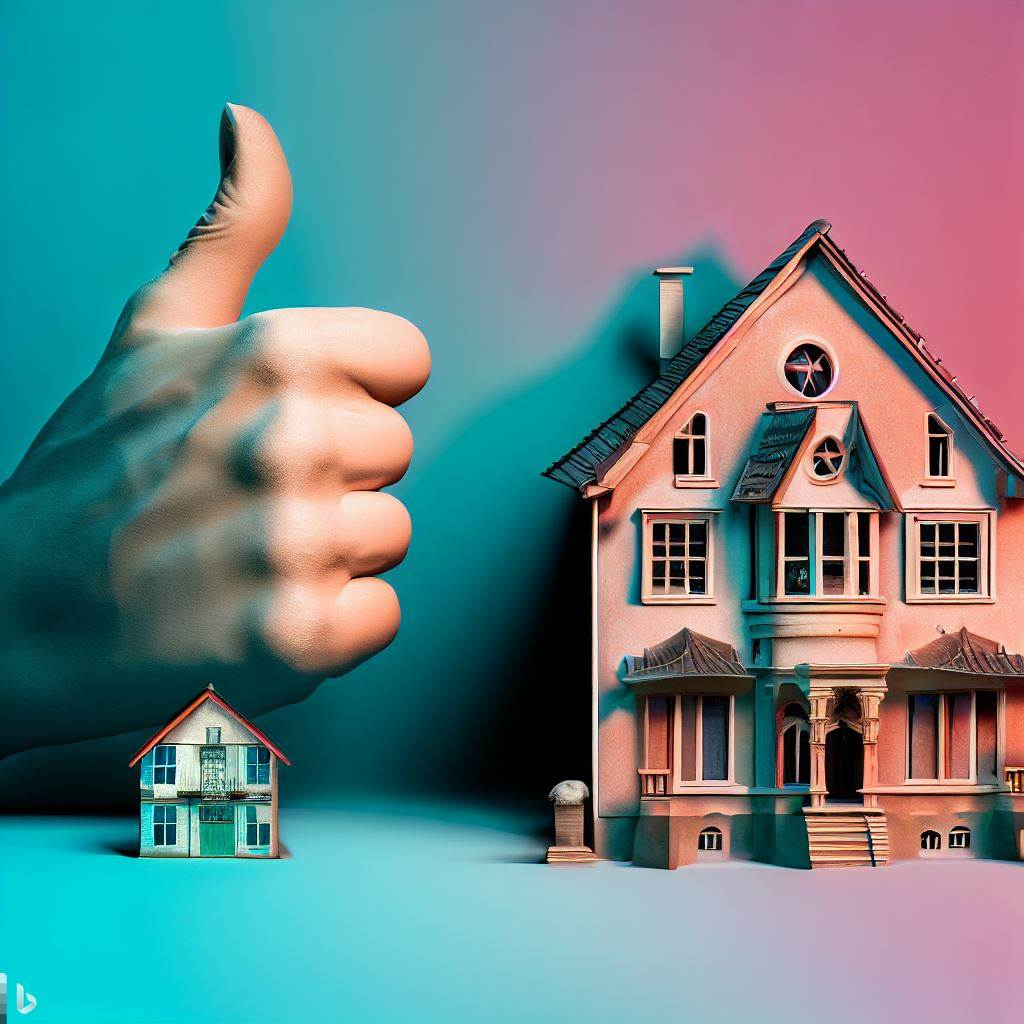
Living in a Small House vs. a Large House: Exploring the Differences and Benefits
Welcome house buyers to our blog with often overlooked topic of living in a small house versus a large house. Should you be in the market for a new home and curious about the differences and benefits of these two types of homes, let me provide you with contrasting features and advantages of living in a small house versus large house. That should provide better understanding of which option might suit your needs.
Table of Contents
Introduction
- Welcome and Purpose
- The Importance of Choosing the Right Home
Size Matters: Understanding the Differences
- Small House: Cozy and Intimate
- Large House: Spacious and Grand
Upkeep and Maintenance: The Joys and Challenges
- Small House: Easier to Maintain
- Large House: More Demanding Maintenance
Financial Considerations: Costs and Savings
- Small House: Budget-Friendly Living
- Large House: Expensive But Luxurious
Lifestyle Factors: Tailoring Your Home to Fit
- Small House: Embracing Simplicity
- Large House: Unlimited Possibilities
Environmental Impact: Going Green
- Small House: Eco-Friendly Living
- Large House: Higher Energy Consumption
Neighborhood and Community: Finding Your Place
- Small House: Closer Connections
- Large House: Privacy and Distance
Flexibility and Adaptability: Planning for the Future
- Small House: Simplified Transitions
- Large House: Room for Growth
Accessibility and Mobility: Moving Freely
- Small House: Easy Navigation
- Large House: Space for All
Privacy and Personal Space: Finding Balance
- Small House: Intimate Living
- Large House: Retreat and Solitude
Decor and Design: Letting Your Style Shine
- Small House: Cozy and Unique
- Large House: Grand Statements
Safety and Security: Peace of Mind
- Small House: Easier to Secure
- Large House: Advanced Security Systems
Energy Efficiency: Sustainable Living
- Small House: Minimized Energy Consumption
- Large House: Energy Management Systems
Commuting and Travel: Considering Accessibility
- Small House: Shorter Journeys
- Large House: Longer Journeys
Natural Light: Brightening Your Home
- Small House: Maximizing Sunshine
- Large House: Ample Windows
Pets and Animals: Welcoming Your Companions
- Small House: Cozy Spaces
- Large House: Space to Roam
Maintenance and Upkeep: Balancing Effort
- Small House: Minimal Maintenance
- Large House: Ongoing Maintenance
Entertainment and Hosting: Space for Gatherings
- Small House: Intimate Gatherings
- Large House: Grand Events
Resale Value: Considering Future Investments
- Small House: Budget-Friendly Option
- Large House: Upscale Market
Conclusion
- The Importance of Personal Preference
- Making an Informed Decision
- The Ultimate Goal: A Happy Home
Living in a house is a wonderful experience that most folks are dreaming about, but choosing between a small house and a large house can be a difficult decision. While some people prefer the cozy atmosphere of a small house, others enjoy the spaciousness that a large house provides. Each option has its own set of advantages and downsides, and it’s crucial to consider your lifestyle, preferences, and needs before making a choice.
Lets pause, and examine various aspects of living in a small house versus a large house. Major points to examine are the space, maintenance, costs, and lifestyle factors associated with each option. In the end, you will have a clearer picture of what it’s like to reside in both types of houses, empowering you to make an informed decision when it’s time to choose your dream home.
Over the years people did view a house as an investment vehicle and for good reasons. After all home prices have increased steadily over the years surpassing the rate of inflation giving impression of a lifetime living in comfort. But that is valid only assuming that you have purchased your home in a growing area that has appreciated above market rate. Nevertheless, this topic deserves to be on frugal minded folks list because a home is one of the greatest investments that we make in our lifetime.
Size Matters: Understanding the Differences
Small House: Cozy and Intimate
Living in a small house offers a unique and cozy experience. These houses are typically compact, with limited square footage. However, don’t let their size fool you; small houses can be full of charm and character. With less space to navigate, everything is within easy reach, fostering a sense of intimacy. The smaller footprint also encourages minimalism and reduces the accumulation of unnecessary possessions.
Large House: Spacious and Grand
On the other hand, living in a large house provides ample space to spread out and indulge in grandeur. These houses are designed with more square footage, allowing for spacious rooms and extensive living areas. Large houses often come with multiple bedrooms, bathrooms, and additional rooms, such as a home office or a playroom. If you value a sense of grandeur and have a growing family or enjoy hosting large gatherings, a large house may be the perfect fit for you.
Upkeep and Maintenance: The Joys and Challenges
Small House: Easier to Maintain
One advantage of living in a small house is the ease of maintenance. With a smaller surface area, cleaning and upkeep tasks become more manageable. You’ll spend less time and effort on chores like vacuuming, dusting, and general tidying up. Additionally, maintenance costs, such as painting or repairing, tend to be lower due to the smaller scale of the house.
Large House: More Demanding Maintenance
Conversely, living in a large house requires more effort and resources to keep it in top shape. The expansive space means more rooms to clean, more surfaces to maintain, and more repairs to address. It’s important to consider the additional time and expenses involved in the regular maintenance of a large house, including landscaping, HVAC system upkeep, and potential renovations.
Financial Considerations: Costs and Savings
Small House: Budget-Friendly Living
Living in a small house can be more affordable compared to a large house. Smaller houses generally come with a lower price tag, making them a budget-friendly option. Furthermore, the reduced square footage translates to lower utility bills since it takes less energy to heat, cool, and light the space. If you’re looking to save money on upfront costs and ongoing expenses, a small house may be the economical choice for you.
Large House: Expensive But Luxurious
On the flip side, large houses typically come with a higher price tag due to their size, location, and amenities. If you’re dreaming of a spacious, luxurious home with high-end finishes and ample outdoor space, be prepared for a larger investment. In addition to the initial cost, larger houses often come with higher property taxes, HOA fees, increased utility expenses, maintenance costs and greater insurance premiums. It’s essential to evaluate your financial situation and consider the long-term costs before committing to a large house.
Lifestyle Factors: Tailoring Your Home to Fit
Small House: Embracing Simplicity
Living in a small house promotes a simpler lifestyle. The limited space encourages you to be intentional with your possessions and prioritize what truly matters to you. It’s an opportunity to declutter and live with only the essentials, fostering a minimalist mindset. If you value a cozy and intimate living environment that requires less maintenance and allows you to focus on experiences rather than possessions, a small house may align with your desired lifestyle.
Large House: Unlimited Possibilities
A large house offers limitless possibilities for creating a customized living space. With ample square footage, you have the freedom to design various rooms to fit your specific needs. Whether you desire a dedicated home gym, a home theater, or a spacious backyard for outdoor activities, a large house can accommodate your vision. If you have a growing family or enjoy entertaining guests frequently, a large house can provide the space and flexibility to cater to your lifestyle preferences.
Environmental Impact: Going Green
Small House: Eco-Friendly Living
Living in a small house is often associated with a smaller carbon footprint. The reduced energy consumption required to heat, cool, and power a smaller space contributes to a more sustainable lifestyle. Additionally, the limited square footage encourages conscious choices when it comes to resource usage. If you’re passionate about minimizing your environmental impact and embracing an eco-friendly lifestyle, a small house aligns well with these values.
Large House: Higher Energy Consumption
In contrast, larger houses tend to have higher energy consumption due to the increased space that needs to be heated, cooled, and illuminated. It’s important to consider the potential environmental impact of a larger house, as it may require more resources to maintain comfortable living conditions. However, with conscious choices in terms of energy-efficient appliances, insulation, and renewable energy sources, you can mitigate the environmental impact of a large house to some extent.
Neighborhood and Community: Finding Your Place
Small House: Closer Connections
Living in a small house can foster a stronger sense of community. Smaller neighborhoods often create a close-knit environment where neighbors interact more frequently. With fewer houses in the vicinity, you have a better opportunity to build meaningful connections and friendships. If you value a tight-knit community where you know your neighbors by name and can rely on them for support, a small house in a close community might be the ideal setting for you.
Large House: Privacy and Distance
On the other hand, living in a large house offers more privacy and distance from neighbors. If you prefer a quieter and more secluded living environment, a large house provides the space and buffer zone to create a personal retreat. Large houses are often located in neighborhoods with more substantial lot sizes, allowing for greater privacy and a sense of exclusivity. Consider your preference for social interactions and the level of privacy you desire when deciding between a small house and a large house.
Flexibility and Adaptability: Planning for the Future
Small House: Simplified Transitions
Living in a small house can simplify transitions in life. Whether you’re a young professional looking for a starter home or an empty-nester downsizing after your children have moved out, a small house offers a more manageable living situation. It requires less effort to maintain and can accommodate changes in your lifestyle more easily. If you anticipate changes in your future, such as career advancements, life stage transitions, or a desire for a more minimalist lifestyle, a small house can provide the flexibility you need.
Large House: Room for Growth
A large house offers ample space for growth and changing circumstances. If you have a growing family or plan to expand your household in the future, a large house can accommodate your needs without requiring immediate renovations or relocations. Additionally, a large house provides room for potential home office spaces, hobby rooms, or additional bedrooms for guests or future family members. Consider your long-term plans and whether a large house aligns with your anticipated lifestyle changes.
Accessibility and Mobility: Moving Freely
Small House: Easy Navigation
Living in a small house offers the advantage of easy navigation and accessibility. With fewer square footage to cover, everything is within close reach. You can move from one room to another without wasting time or energy. The compact layout promotes efficiency and convenience, making it especially suitable for individuals with mobility challenges or those who prefer a more streamlined living experience.
Large House: Space for All
A large house provides ample space for mobility and movement. The generous square footage allows family members to move around freely without feeling cramped or restricted. It’s ideal for households with children or multiple occupants who value personal space and individual mobility. If you prioritize the freedom to spread out and have enough room for everyone to move around comfortably, a large house can accommodate your mobility needs.
Privacy and Personal Space: Finding Balance
Small House: Intimate Living
Living in a small house often fosters a greater sense of intimacy and togetherness. The limited space encourages family members to interact and spend time together in shared areas. If you value close-knit family bonding and enjoy the coziness of shared spaces, a small house can provide the intimate living environment you desire.
Large House: Retreat and Solitude
In contrast, a large house offers the advantage of more private and personal space. With separate rooms and more square footage, family members can retreat to their individual spaces when they need solitude or quiet time. This can be particularly valuable for households with different schedules, varied interests, or individuals who prioritize personal space. If you value privacy and the ability to have separate areas for different activities, a large house may be the better choice for you.
Decor and Design: Letting Your Style Shine
Small House: Cozy and Unique
Living in a small house allows you to create a cozy and unique living space. With limited square footage, you can focus on the details and make every corner reflect your personal style. Small houses often have a distinct charm and character, showcasing your creativity in maximizing the available space. If you enjoy the challenge of designing a compact yet stylish home, a small house can be a canvas for your unique decor ideas.
Large House: Grand Statements
In a large house, you have the opportunity to make grand design statements. With spacious rooms and expansive walls, you can incorporate bold architectural elements, large-scale furniture, and eye-catching artwork. A large house provides the canvas for grandeur and allows you to create a visually impressive living space. If you prefer a more dramatic and statement-making approach to interior design, a large house can accommodate your vision.
Safety and Security: Peace of Mind
Small House: Easier to Secure
Living in a small house can provide a greater sense of security and peace of mind. With fewer entry points and a compact layout, it’s easier to secure the house and monitor activity. Additionally, a smaller house may be located in a close-knit community where neighbors watch out for one another. If safety and security are top priorities for you, a small house in a secure neighborhood can offer the peace of mind you seek.
Large House: Advanced Security Systems
A large house often comes with advanced security systems and features. With more space to cover, homeowners may invest in comprehensive security measures, such as surveillance cameras, alarm systems, and gated entries. These additional security measures can provide an extra layer of protection and deter potential intruders. If you prefer the added security options that come with a larger house and have specific concerns about safety, a large house may offer the peace of mind you’re looking for.
Energy Efficiency: Sustainable Living
Small House: Minimized Energy Consumption
Living in a small house typically translates to minimized energy consumption. With a smaller space to heat, cool, and illuminate, the energy requirements are reduced. This can lead to lower utility bills and a reduced environmental footprint. If you’re passionate about sustainable living and want to minimize your energy usage, a small house aligns well with your goals.
Large House: Energy Management Systems
In a large house, energy management systems can be implemented to improve efficiency. These systems can include smart thermostats, energy-efficient appliances, and advanced insulation. While a larger house may require more energy to maintain comfortable living conditions, incorporating these technologies can help optimize energy usage and reduce waste. If you’re interested in sustainable living and willing to invest in energy management systems, a large house can still be environmentally conscious.
Commuting and Travel: Considering Accessibility
Small House: Shorter Journeys
Living in a small house often means being located in more urban or centralized areas. That is because most smaller houses have been constructed decades ago before builders started building large homes in outlying areas to maximize profit. This can result in shorter commuting distances and easier access to amenities such as schools, parks, and shopping centers. If minimizing commuting time and having convenient access to nearby facilities is a priority, a small house may be the ideal choice.
Large House: Longer Journeys
In contrast, large houses are often situated in suburban or rural areas. While this offers the advantage of more space and tranquility, it can also mean longer commuting distances. If you prefer a quieter living environment and are willing to trade longer commuting journeys for the benefits of a large house, the suburban or rural setting may suit your preferences.
Natural Light: Brightening Your Home
Small House: Maximizing Sunshine
Living in a small house requires strategic planning to maximize natural light. With limited square footage, it’s crucial to make the most of available windows and openings to let sunlight flood the space. This can create a bright and airy atmosphere that enhances the perception of a larger living area. If you value abundant natural light and enjoy the cozy ambiance it creates, a small house can provide the opportunity to optimize sunshine.

Large House: Ample Windows
In a large house, ample windows can contribute to a well-lit and inviting living space. With more square footage, there’s often greater flexibility in window placement, allowing for abundant natural light throughout the house. Large houses can benefit from the expansive use of glass, bringing the outdoors inside and creating a connection with the surrounding landscape. If you appreciate spacious and light-filled interiors, a large house with ample windows may be the perfect fit.
Pets and Animals: Welcoming Your Companions
Small House: Cozy Spaces
Living in a small house can be suitable for pets and animals, especially those that don’t require a large living area. With less space to navigate, pets can easily move around and feel comfortable in a cozy environment. Small houses can be particularly suitable for cats, small dogs, or other animals that thrive in compact spaces. If you have a pet that doesn’t require extensive room to roam, a small house can provide a comfortable and secure home for your furry companion.
Large House: Space to Roam
A large house offers ample space for pets to roam and play. With larger rooms and potentially a backyard or outdoor area, pets can have their designated areas to explore and enjoy. Large houses are ideal for dogs or animals that require more room to move around or engage in physical activities. If you have multiple pets or larger animals that need space to thrive, a large house can accommodate their needs more effectively.
Maintenance and Upkeep: Balancing Effort
Small House: Minimal Maintenance
One of the advantages of living in a small house is minimal maintenance. With fewer square footage to clean, maintain, and repair, it requires less time and effort to keep the house in good condition. Cleaning, painting, and general upkeep become more manageable tasks. If you prefer a low-maintenance living situation that allows you to spend your time and energy on other activities, a small house can be a practical choice.
Large House: Ongoing Maintenance
A large house typically entails more significant maintenance requirements. With more rooms, outdoor spaces, and systems to maintain, there is a greater need for ongoing upkeep. This includes regular cleaning, landscaping, repairs, and potential renovations. If you enjoy investing time and effort into maintaining a property or have the resources to outsource maintenance tasks, a large house may suit your lifestyle. However, it’s essential to consider the additional responsibilities and costs associated with upkeep.
Entertainment and Hosting: Space for Gatherings
Small House: Intimate Gatherings
Living in a small house encourages intimate gatherings and cozy get-togethers. With limited space, it’s easier to create a warm and inviting atmosphere for close friends and family. Small houses promote a sense of togetherness and can be ideal for hosting small dinner parties, game nights, or casual gatherings. If you enjoy intimate and cozy entertaining, a small house can provide the perfect setting for memorable social occasions.
Large House: Grand Events
A large house offers the advantage of space for grand events and larger gatherings. With multiple rooms, a spacious kitchen, and potentially outdoor entertainment areas, you can host elaborate parties, family reunions, or special celebrations. Large houses provide the flexibility to accommodate a higher number of guests and offer various entertainment options. If you frequently host large gatherings or value the ability to throw impressive parties, a large house can fulfill your entertaining aspirations.
Resale Value: Considering Future Investments
Small House: Budget-Friendly Option
Small houses often come with a more affordable price tag, making them an attractive option for budget-conscious buyers. While their smaller size may limit the pool of potential buyers, there is still a market for compact and affordable homes. If you’re looking for a budget-friendly investment and prioritize affordability over size, a small house can offer a practical choice with potential for resale value.
Large House: Upscale Market
Large houses, especially those in desirable locations or with luxurious features, can have a higher resale value. They appeal to buyers seeking spacious and high-end living spaces. While the initial investment may be significant, a well-maintained and thoughtfully designed large house can yield a higher return on investment in the future. If you’re willing to make a larger upfront investment and anticipate the potential for a higher resale value, a large house can be a worthwhile consideration.
Conclusion
Living in a small house versus a large house comes with its own set of differences, benefits, and downsides. It ultimately boils down to personal preferences, lifestyle choices, and future plans. Small houses offer simplicity, affordability, and a closer sense of togetherness, while large houses provide room for growth, individual space, and grand living experiences. Consider your priorities, long-term goals, and the specific needs of your household when making the decision. What matters most is finding a home that suits your unique lifestyle and brings you joy and contentment.
Now that you’ve explored the differences and benefits of living in a small house versus a large house, it might be time to make an informed decision that aligns with your preferences and aspirations. Whether you choose a cozy and intimate small house or a spacious and grand large house, what matters most is creating a home that reflects your personality and meets your needs.
Go ahead, no matter what size of home you purchase or upgrade to, stay happy.







